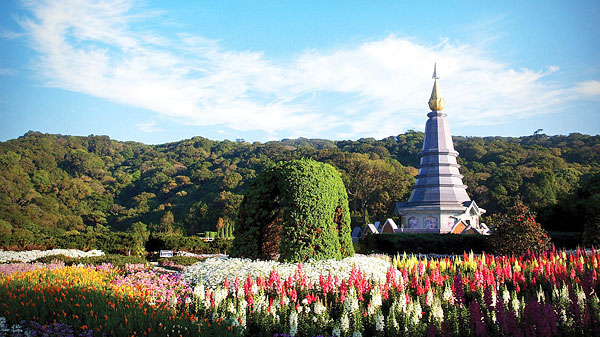Whenever you think of Thailand, you could be forgiven for thinking first and foremost of its beaches. Whether it’s the pristine-ish sands of Krabi, scuba diving off the Similan Islands or Koh Samui’s notorious full-moon parties, it’s Thailand’s southern coast that has captured the imagination of international travellers.

But should you prefer a road less travelled, then maybe you’d be better advised to forsake the South in favour of the not-nearly-as-non-natively-populated North. Bordering Laos and Myanmar, this forested mountainous landmass – home to several hill tribes – has largely eluded the touristy hordes to date, leaving its quaint, time-honoured rural charm surprisingly intact.
Here, your point of entry should be Chiang Mai, the provincial capital. Its contrast with Bangkok, the country’s capital and largest metropolis, however, couldn’t be more obvious from the moment you step out of the airport. With its winding canals a welcome relief after the capital’s glacial traffic flows and its lush mountains reassuringly rural compared to Bangkok’s burgeoning high-rise skyline, it’s clear you are in holiday territory.

The proud capital of the Lanna Kingdom, home to the Burma-backed dynasty that ruled the region from the 13th to the 18th century, Chiang Mai is replete with remnants of its regal past, with something memorably majestic to be found in every nook and corner. Nowhere is this more apparent than within its walled Old City, an enclave that has cosseted and preserved its cherished array of Buddhist temples for more than 800 years.

While you can visit every temple within the Old City complex, more sedate sightseers can take in the more renowned sites – notably Wat Phra Singh and Wat Chedi Luang – in a more relaxed fashion. However you arrange your itinerary, though, make sure to include Wat Doi Suthep, arguably the most revered and photogenic temple in the whole of northern Thailand.
Should the sheer volume of Chiang Mai’s venerable shrines see you teeter on the templed-out, opt for a change of pace and head to the Elephant Nature Park, a rescue and rehabilitation centre for the magnificent beasts that are Thailand’s Official National Animals. As part of a major conservation initiative that began back in the early ’90s, you can book into the camp and help take care of its mighty charges, all under the watchful eye of its highly-experienced staff.

Should mucking out a pachyderm not be your idea of the perfect vacation, an excursion to the nearby town of Chiang Rai might better meet your holidaying needs. Architecturally similar to 200km-distant Chiang Mai, the smaller and sleepier mountain town of Chiang Rai can be found just beyond the Doi Inthanon National Park. As befits its mini-me status, it boasts its own regal connections and, of course, its own array of shrines.
Unlike its big brother, though, the slightly more remote Chiang Rai has relatively few tourists, allowing its small number of hardy visitors a rare opportunity to immerse themselves in unadulterated Thai culture. One can’t-miss spot is Wat Rong Khun, one of the region’s few temples with an all-white finish.

For something definitely different, head directly to Pai, one of the true gems in the nearby Mae Hong Soon Province. Although only a three-hour ride away from Chiang Mai, you’ll feel the centuries roll back as you near this unspoilt river valley. While any visitor to Pai will be tempted just to revel in the moment and bask in its timeless beauty, there’s actually plenty to explore – hot springs, deep gorges, rolling meadows, steep ridges, classically-tended paddy fields… Don’t, however, feel duty-bound to take in too much. In Pai, the more you proactively venture forth, the more you risk failing to fully experience this unique location.
It’s the curse of the contemporary traveller that, after artfully arranging flights, changing currencies, masterminding time-maximising itineraries and setting out to ensure that no authentic aspect of your chosen destination goes unsavoured, you can often end up missing the point entirely. While cramming in every cultural crumb and leaving no shrine unseen and no cuisine unsampled, this hurried cut-and-paste sensory overload can leave you wholly untouched by the landscape you so briefly visit. If ever there was a place to merely linger, forsaking the imperative to rack up novelties and nuances for an hour or two, it is surely Pai.
Text: Suchetana Mukhopadhyay
Photos: Souvik Mukherjee



